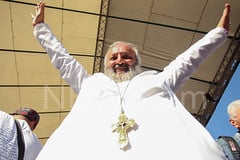
In an interview with Armenian News-NEWS.am Armenia's Consul General in Batumi Aram Grigoryan tells about development of Armenia-Georgia relations, the life of Armenian community in Adjara, tens of thousands of tourists coming to the region every summer.
Armenia's Consulate General in Batumi does a huge job especially in summer season. Tell a little about the history of the opening of consulate and daily routine.
Armenia's Consulate General in Batumi was founded in April 2008. We are working in Imereti and Guria regions, Adjara autonomous republic as well as a port city of Poti. The consulate was opened on the initiative of the then Armenia's Ambassador to Georgia Hrach Silvanyan, and it was a strategically right decision.
.jpg)
There are many Armenians living in Georgia, and there is old community with rich history and traditions in Adjara. In addition this region is a key hub, the largest crossing point on Georgia-Turkey border. There are numerous citizens of Armenia passing every day, and it is much easier to solve the problems on the ground.
The sea resorts of Adjara and Guria have become popular destination for thousands of Armenians. Unfortunately, very often the holidays of our compatriots are accompanied by difficulties, and sometimes tragic incidents, and the consulate staff are working to solve this problems.
.jpg)
Besides, around 70% of goods imported by Armenia are coming to the port of Batumi and Poti and then moving to Armenia by train.
We are focused on these directions, but we are also working to promote cooperation between Armenia and Armenian regions with Adjara. We must do our utmost to expand and develop cooperation in the future.
Batumi has become new homeland for many refugees from adjacent Ardvin that is situated in the territory of today's Turkey. What role does Armenian community have in the life of the city?
The last census, conducted in 2007, showed that Adjara is home to around 10 thousand Armenians, of which 8.5 thousand live in Batumi. Over the past eight years this figure has not changed significantly, except for the fact that part of Adjara Armenians are now engaged in seasonal work abroad. Employment, the preservation of national identity, freedom of movement – these are the most important issues for the local Armenians.
Batumi often became life-saving door for thousands of our compatriots who had fled from the cruel massacres of Armenians in Turkey. Many of them have stayed at this hospitable land. Armenian philanthropist and businessman Alexander Mantashev lived and worked in Batumi for many years. His beautiful house is situated in the center of the city.
There was a church, an Armenian theater, school, Armenian newspapers. It is safe to say that Batumi was largely Armenian town, and I want to note that Batumi Armenians are trying to keep these elements of the atmosphere to this day. I want to emphasize that an Armenian church of St. Savior built in 1895 is the main link consolidating the Armenian community of Batumi.
.jpg)
Tens of thousands of our compatriots come to Batumi for holiday season. Isn't it difficult to solve all problems? Are there an cases that can puzzle diplomats?
Indeed, the period from mid-June to the end of September is the busiest not only for local coastal areas, but also for the Consulate General. It is especially difficult when someone dies, and this, unfortunately, occurs every year. For example, in 2013, four people sank, and three of them were citizens of Armenia. Often there are other incidents that require intervention of the Consulate General.
.jpg)
You are one of the experienced Armenian diplomats. What is your advice to young diplomats who will continue your mission?
No one is born being a diplomat. You can become a diplomat, but there are few people who can really become diplomats, because this job has many requirements.
First diplomat should love his homeland and be prepared to make sacrifice for the sake of it. The diplomat must be well-educated. He must be familiar with the works of classics. He should have good knowledge of history, political science, political processes, he should know everything connected with his country from literature, history, art, and up to all the news.
It is very important to have analytical thinking, an ability to quickly navigate and make the right decisions. There are times when one word, even a comma can be fatal for your state. This means that your every word must be weighed carefully and thought out to the end, because by saying it you will not be able to correct it any more. This means that any pre-scheduled meeting or a private conversation must be well prepared.
A man without humor, I say it openly, has nothing to do with this job. In this case, the humor must be intelligent. I would advise that young diplomats read, in addition to the special literature, the works by classics of diplomacy. In this sense, it is very useful to study the period of Napoleon Bonaparte. The emperor himself was not only a gifted military leader, but also a great diplomat, otherwise he could not be able to take advantage of the fruits of his military success. In addition, he had a unique foreign minister, whose name was Charles Maurice de Talleyrand Perigord. Numerous statements of this extraordinary man are still relevant today, two hundred years later. Let me remind you one of his quotes: “Language was given to a man to conceal his thoughts.”
Of course, a brilliant diplomat must know several languages. If you are appointed to another country, you must not only learn everything connected with it, but also to learn the language because by this move you show your respect for the host country and the people. It is perceived positively and at the same time improves the image of your country.
The previous interviews in this project:
Talk with Ambassador: Tatoul Markarian
Talk with Ambassador: Armen Khachatryan






















